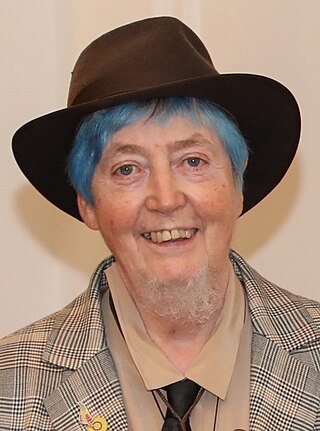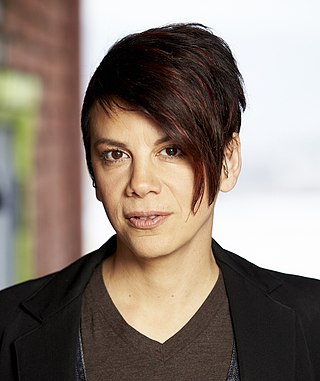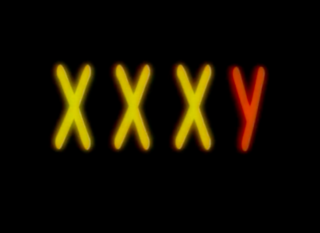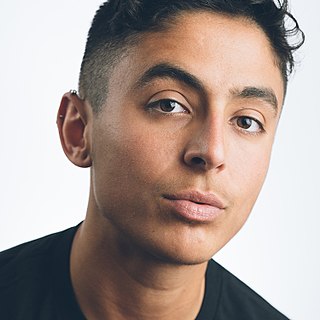
Mani Bruce Mitchell is an intersex activist and counsellor from Wellington, New Zealand. In 2021, Mitchell was recognised as a Member of the New Zealand Order of Merit.
Advocates for Informed Choice, dba interACT or interACT Advocates for Intersex Youth, is a 501(c)(3) nonprofit organization advocating for the legal and human rights of children with intersex traits. The organization was founded in 2006 and formally incorporated on April 12, 2010.

Intersex Human Rights Australia (IHRA) is a voluntary organisation for intersex people that promotes the human rights and bodily autonomy of intersex people in Australia, and provides education and information services. Established in 2009 and incorporated as a charitable company in 2010, it was formerly known as Organisation Intersex International Australia, or OII Australia. It is recognised as a Public Benevolent Institution.

Hida Viloria is an American writer, author, producer, and human rights activist of Latin American origin. Viloria is intersex, nonbinary, and genderfluid, using they/them pronouns. They are known for their writing, their intersex and non-binary human rights activism, and as one of the first people to come out in national and international media as a nonbinary intersex person. Viloria is Founding Director of the Intersex Campaign for Equality.
Anne Tamar-Mattis is an American attorney, human rights advocate, and founder of interACT. She currently serves as interACT's Legal Director.

The International Intersex Forum is an annual event organised, then later supported, by the ILGA and ILGA-Europe that and organisations from multiple regions of the world, and it is believed to be the first and only such intersex event.
Phoebe Hart is an Australian filmmaker, lecturer and intersex rights activist, born with Androgen Insensitivity Syndrome. Hart lectures in film, television and digital media at the Queensland University of Technology, and is principal of Hartflicker, a video and film production company. She is known particularly for her autobiographical road trip movie, Orchids, My Intersex Adventure.
Tiger Devore, previously known as Howard Devore and Tiger Howard Devore, is an American clinical psychologist, sex therapist, and spokesperson on intersex issues. He was a member of the defunct Intersex Society of North America. Historian Alice Dreger credits him with starting the work of the intersex movement.

XXXY is a short documentary directed by Porter Gale and Laleh Soomekh.
Intersex Aotearoa is a nonprofit organisation based in New Zealand, and is a national advocacy and peer support organisation for intersex people. The organisation was founded in 1996 by Mani Mitchell, and has previously been known as the Intersex Trust Aotearoa New Zealand and Intersex Awareness New Zealand.

Intersex, in humans and other animals, describes variations in sex characteristics including chromosomes, gonads, sex hormones, or genitals that, according to the UN Office of the High Commissioner for Human Rights, "do not fit typical binary notions of male or female bodies". Intersex is a part of nature and that is reflected in some representations of intersex in film and other media.

Intersex, in humans and other animals, describes variations in sex characteristics including chromosomes, gonads, sex hormones, or genitals that, according to the UN Office of the High Commissioner for Human Rights, "do not fit typical binary notions of male or female bodies".

Pidgeon Pagonis is an American intersex activist, writer, artist, and consultant. They are an advocate for intersex human rights and against nonconsensual intersex medical interventions.

Intersex people are born with sex characteristics that "do not fit the typical definitions for male or female bodies". They are substantially more likely to identify as lesbian, gay, bisexual, or transgender (LGBT) than endosex people. According to a study done in Australia of Australian citizens with intersex conditions, participants labeled 'heterosexual' as the most popular single label with the rest being scattered among various other labels. According to another study, an estimated 8.5% to 20% experiencing gender dysphoria. Although many intersex people are heterosexual and cisgender, this overlap and "shared experiences of harm arising from dominant societal sex and gender norms" has led to intersex people often being included under the LGBT umbrella, with the acronym sometimes expanded to LGBTI. Some intersex activists and organisations have criticised this inclusion as distracting from intersex-specific issues such as involuntary medical interventions.

Intersex rights in New Zealand are protections and rights afforded to intersex people. Protection from discrimination is implied by the Human Rights Act and the Bill of Rights Act, but remains untested. The New Zealand Human Rights Commission states that there has seemingly been a "lack of political will to address issues involved in current practices of genital normalisation on intersex children".

Intersex people in the United States have some of the same rights as other people, but with significant gaps, particularly in protection from non-consensual cosmetic medical interventions and violence, and protection from discrimination. Actions by intersex civil society organizations aim to eliminate harmful practices, promote social acceptance, and equality. In recent years, intersex activists have also secured some forms of legal recognition. Since April 11, 2022 US Passports give the sex/gender options of male, female and X by self determination.

The Malta declaration is the statement of the Third International Intersex Forum, which took place in Valletta, Malta, in 2013. The event was supported by the ILGA and ILGA-Europe and brought together 34 people representing 30 organisations from multiple regions of the world.

Intersex people are born with natural variations in physical and sex characteristics including those of the chromosomes, gonads, sex hormones, or genitals that, according to the UN Office of the High Commissioner for Human Rights, "do not fit the typical definitions for male or female bodies". Such variations may involve genital ambiguity, and combinations of chromosomal genotype and sexual phenotype other than XY-male and XX-female. Preimplantation genetic diagnosis allows the elimination of embryos and fetuses with intersex traits and thus has an impact on discrimination against intersex people.
Esther Morris Leidolf is an American medical sociologist, and author of NOT UNCOMMON, Just Unheard of. An intersex activist, writer, and the founder of the MRKH Organization, Leidolf was the board secretary for the Intersex Society of North America.








